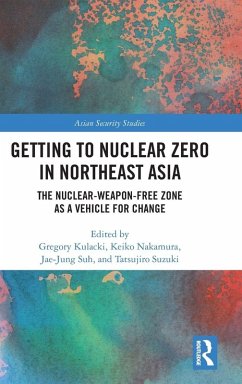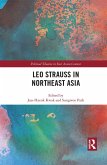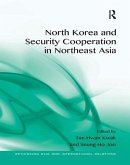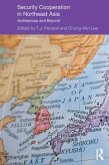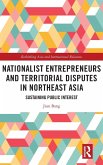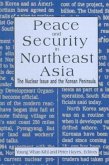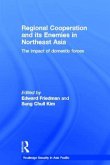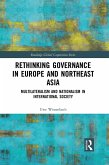Getting to Nuclear Zero in Northeast Asia
The Nuclear-Weapon-Free Zone as a Vehicle for Change
Herausgeber: Kulacki, Gregory; Suh, Jae-Jung; Nakamura, Keiko
Getting to Nuclear Zero in Northeast Asia
The Nuclear-Weapon-Free Zone as a Vehicle for Change
Herausgeber: Kulacki, Gregory; Suh, Jae-Jung; Nakamura, Keiko
- Gebundenes Buch
- Merkliste
- Auf die Merkliste
- Bewerten Bewerten
- Teilen
- Produkt teilen
- Produkterinnerung
- Produkterinnerung
This book presents realistic alternatives to security policies based on nuclear weapons for the Northeast Asian region.
Andere Kunden interessierten sich auch für
![Leo Strauss in Northeast Asia Leo Strauss in Northeast Asia]() Leo Strauss in Northeast Asia54,99 €
Leo Strauss in Northeast Asia54,99 €![North Korea and Security Cooperation in Northeast Asia North Korea and Security Cooperation in Northeast Asia]() Tae-Hwan KwakNorth Korea and Security Cooperation in Northeast Asia70,99 €
Tae-Hwan KwakNorth Korea and Security Cooperation in Northeast Asia70,99 €![Security Cooperation in Northeast Asia Security Cooperation in Northeast Asia]() Security Cooperation in Northeast Asia176,99 €
Security Cooperation in Northeast Asia176,99 €![Nationalist Entrepreneurs and Territorial Disputes in Northeast Asia Nationalist Entrepreneurs and Territorial Disputes in Northeast Asia]() Jiun BangNationalist Entrepreneurs and Territorial Disputes in Northeast Asia175,99 €
Jiun BangNationalist Entrepreneurs and Territorial Disputes in Northeast Asia175,99 €![Peace and Security in Northeast Asia Peace and Security in Northeast Asia]() Peter HayesPeace and Security in Northeast Asia43,99 €
Peter HayesPeace and Security in Northeast Asia43,99 €![Regional Co-operation and Its Enemies in Northeast Asia Regional Co-operation and Its Enemies in Northeast Asia]() Edward Friedman (ed.)Regional Co-operation and Its Enemies in Northeast Asia114,99 €
Edward Friedman (ed.)Regional Co-operation and Its Enemies in Northeast Asia114,99 €![Rethinking Governance in Europe and Northeast Asia Rethinking Governance in Europe and Northeast Asia]() Uwe WissenbachRethinking Governance in Europe and Northeast Asia56,99 €
Uwe WissenbachRethinking Governance in Europe and Northeast Asia56,99 €-
-
-
This book presents realistic alternatives to security policies based on nuclear weapons for the Northeast Asian region.
Produktdetails
- Produktdetails
- Verlag: Routledge
- Seitenzahl: 240
- Erscheinungstermin: 27. Juni 2025
- Englisch
- Abmessung: 240mm x 161mm x 18mm
- Gewicht: 529g
- ISBN-13: 9781032977676
- ISBN-10: 1032977671
- Artikelnr.: 73332956
- Herstellerkennzeichnung
- Libri GmbH
- Europaallee 1
- 36244 Bad Hersfeld
- gpsr@libri.de
- Verlag: Routledge
- Seitenzahl: 240
- Erscheinungstermin: 27. Juni 2025
- Englisch
- Abmessung: 240mm x 161mm x 18mm
- Gewicht: 529g
- ISBN-13: 9781032977676
- ISBN-10: 1032977671
- Artikelnr.: 73332956
- Herstellerkennzeichnung
- Libri GmbH
- Europaallee 1
- 36244 Bad Hersfeld
- gpsr@libri.de
Gregory Kulacki is the East Asia Project Director for the Union of Concerned Scientists, USA, and a Non-Resident Fellow at the Research Center for Nuclear Weapons Abolition at Nagasaki University, Japan. Keiko Nakamura is an Associate Professor at the Research Center for Nuclear Weapons Abolition, Nagasaki University (RECNA), Japan. Jae-Jung Suh is Professor of International Relations at International Christian University, Japan and author and editor of several books on security in Northeast Asia and Korea. Tatsujiro Suzuki is a Visiting Professor at the Research Center for Nuclear Weapons Abolition, Nagasaki University (RECNA), Japan. Before joining RECNA, he served as Vice Chairman of Japan Atomic Energy Commission from 2010 to 2014. He is the author of Nuclear Weapons and Nuclear Power (2017).
Chapter 1. An Opening for Regional Denuclearization: Executive Introduction
Chapter 2. The US-China Competition Is Going Nuclear: Deadlock on Thin Ice
Chapter 3. A Nuclear-Weapons-Free Zone in Northeast Asia: From a Japanese
Security Perspective Chapter 4. Changing Security Dynamics in the Korean
Peninsula: Rising Strategic Competition, Destabilizing Balance of Terror
Chapter 5. The Mongolian Miracle: Chapter 6. Revisiting the Comprehensive
Security Roadmap To Reduce the Risk of War on the Korean Peninsula Chapter
7. Reconsidering Extended Nuclear Deterrence: Chapter 8. Rationale for a
NWFZ in Northeast Asia Leading to Global Nuclear Disarmament: A Viewpoint
from International Law Chapter 9: Getting to Zero in Korea: Chapter 10.
Civil Society Initiatives for Establishing a Northeast Asia Nuclear
Weapon-Free Zone: Chapter 11. Toward a Secure Northeast Asia without
Nuclear Weapons: Proposing NWFZ 2.0 and a C3 Security Regime
Chapter 2. The US-China Competition Is Going Nuclear: Deadlock on Thin Ice
Chapter 3. A Nuclear-Weapons-Free Zone in Northeast Asia: From a Japanese
Security Perspective Chapter 4. Changing Security Dynamics in the Korean
Peninsula: Rising Strategic Competition, Destabilizing Balance of Terror
Chapter 5. The Mongolian Miracle: Chapter 6. Revisiting the Comprehensive
Security Roadmap To Reduce the Risk of War on the Korean Peninsula Chapter
7. Reconsidering Extended Nuclear Deterrence: Chapter 8. Rationale for a
NWFZ in Northeast Asia Leading to Global Nuclear Disarmament: A Viewpoint
from International Law Chapter 9: Getting to Zero in Korea: Chapter 10.
Civil Society Initiatives for Establishing a Northeast Asia Nuclear
Weapon-Free Zone: Chapter 11. Toward a Secure Northeast Asia without
Nuclear Weapons: Proposing NWFZ 2.0 and a C3 Security Regime
Chapter 1. An Opening for Regional Denuclearization: Executive Introduction
Chapter 2. The US-China Competition Is Going Nuclear: Deadlock on Thin Ice
Chapter 3. A Nuclear-Weapons-Free Zone in Northeast Asia: From a Japanese
Security Perspective Chapter 4. Changing Security Dynamics in the Korean
Peninsula: Rising Strategic Competition, Destabilizing Balance of Terror
Chapter 5. The Mongolian Miracle: Chapter 6. Revisiting the Comprehensive
Security Roadmap To Reduce the Risk of War on the Korean Peninsula Chapter
7. Reconsidering Extended Nuclear Deterrence: Chapter 8. Rationale for a
NWFZ in Northeast Asia Leading to Global Nuclear Disarmament: A Viewpoint
from International Law Chapter 9: Getting to Zero in Korea: Chapter 10.
Civil Society Initiatives for Establishing a Northeast Asia Nuclear
Weapon-Free Zone: Chapter 11. Toward a Secure Northeast Asia without
Nuclear Weapons: Proposing NWFZ 2.0 and a C3 Security Regime
Chapter 2. The US-China Competition Is Going Nuclear: Deadlock on Thin Ice
Chapter 3. A Nuclear-Weapons-Free Zone in Northeast Asia: From a Japanese
Security Perspective Chapter 4. Changing Security Dynamics in the Korean
Peninsula: Rising Strategic Competition, Destabilizing Balance of Terror
Chapter 5. The Mongolian Miracle: Chapter 6. Revisiting the Comprehensive
Security Roadmap To Reduce the Risk of War on the Korean Peninsula Chapter
7. Reconsidering Extended Nuclear Deterrence: Chapter 8. Rationale for a
NWFZ in Northeast Asia Leading to Global Nuclear Disarmament: A Viewpoint
from International Law Chapter 9: Getting to Zero in Korea: Chapter 10.
Civil Society Initiatives for Establishing a Northeast Asia Nuclear
Weapon-Free Zone: Chapter 11. Toward a Secure Northeast Asia without
Nuclear Weapons: Proposing NWFZ 2.0 and a C3 Security Regime

